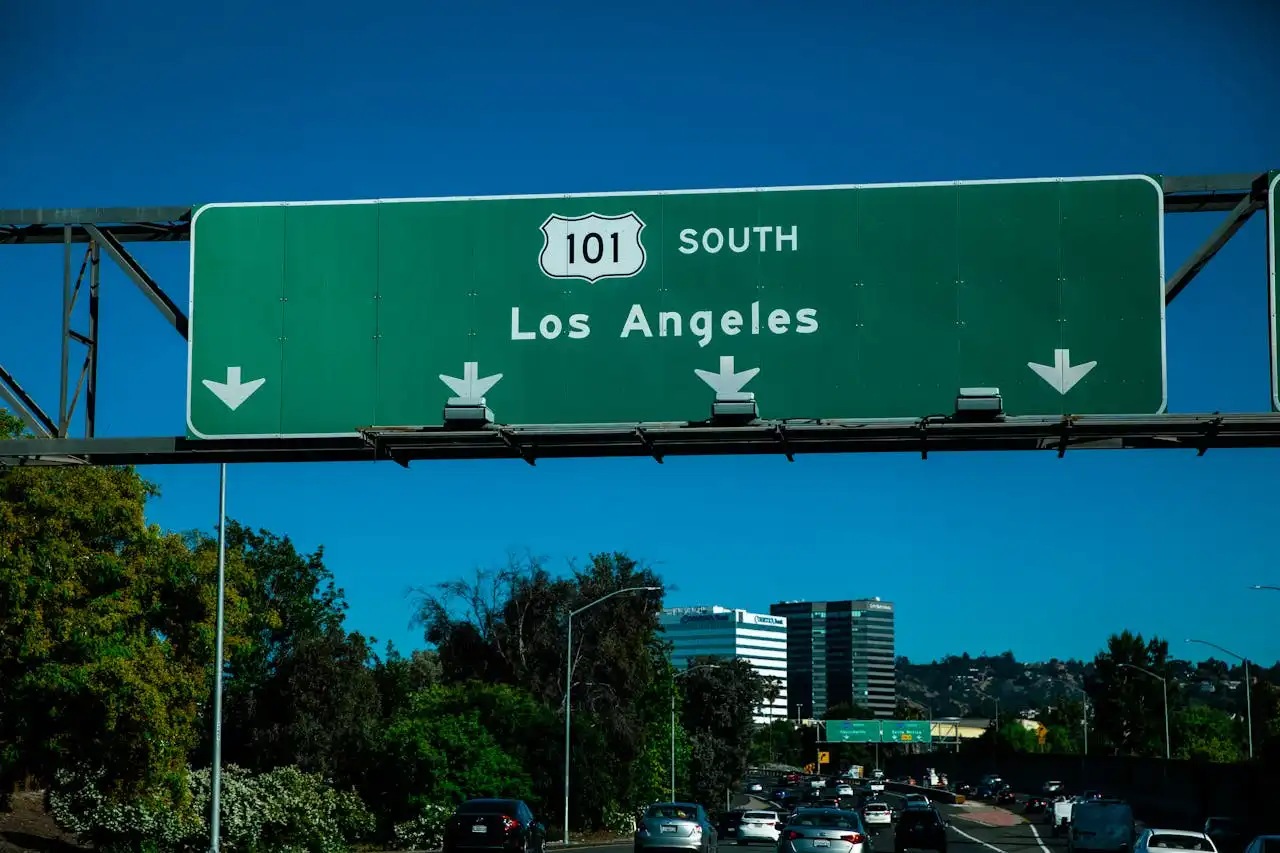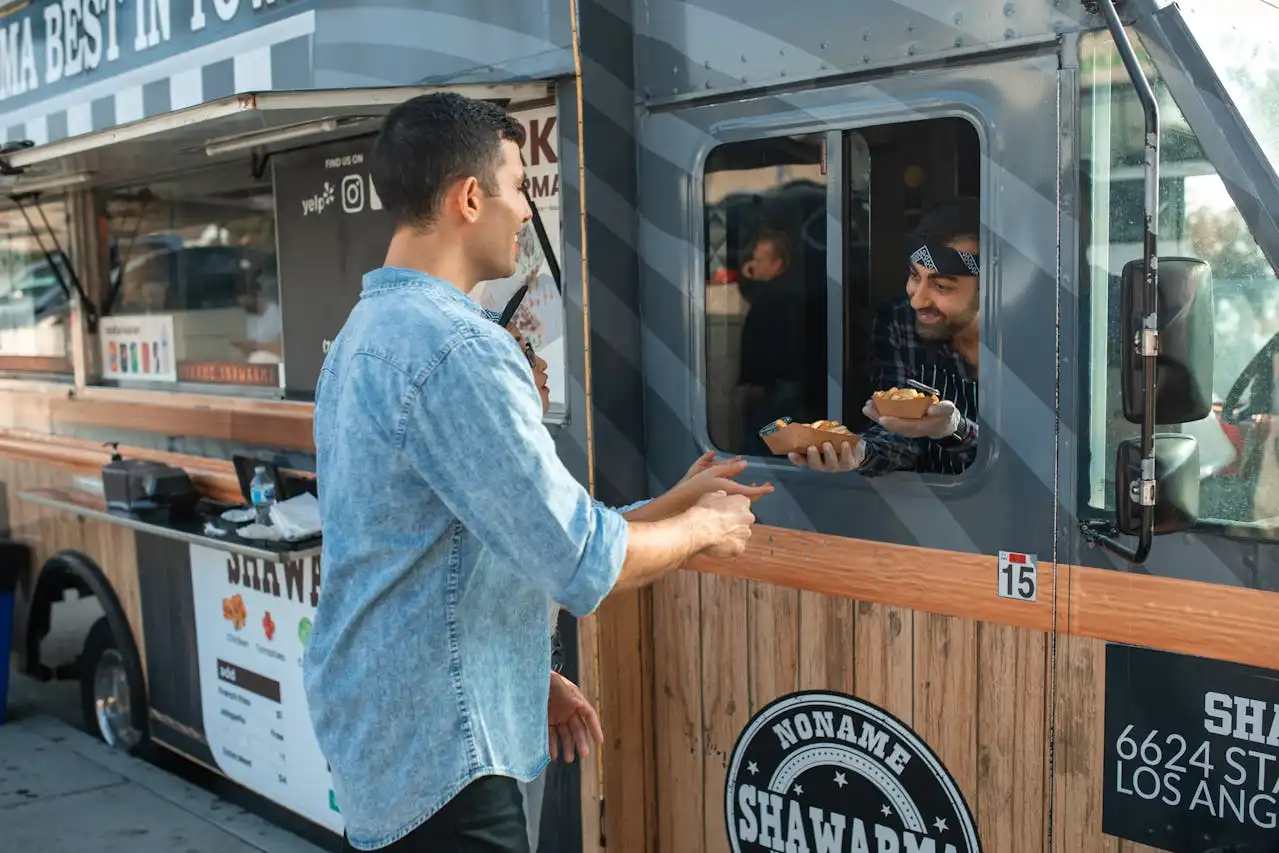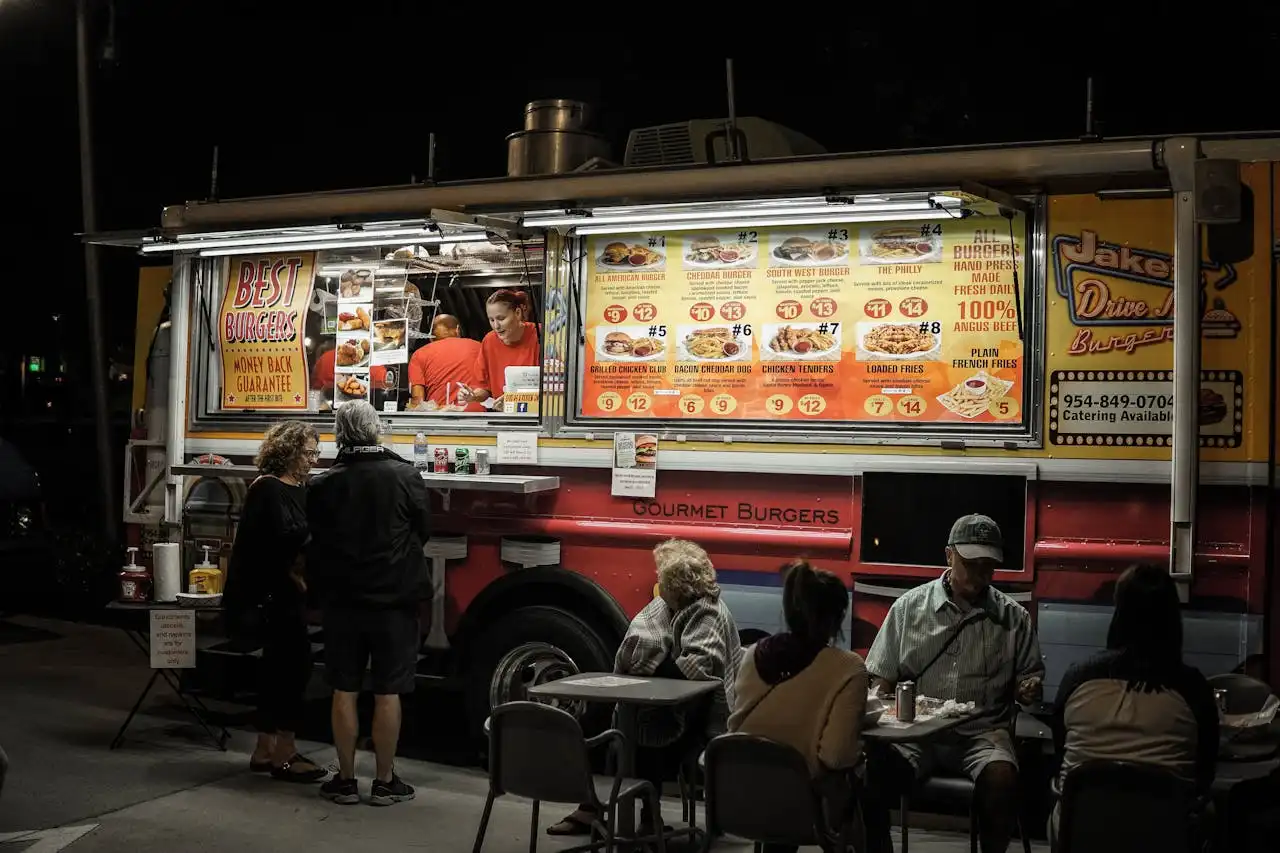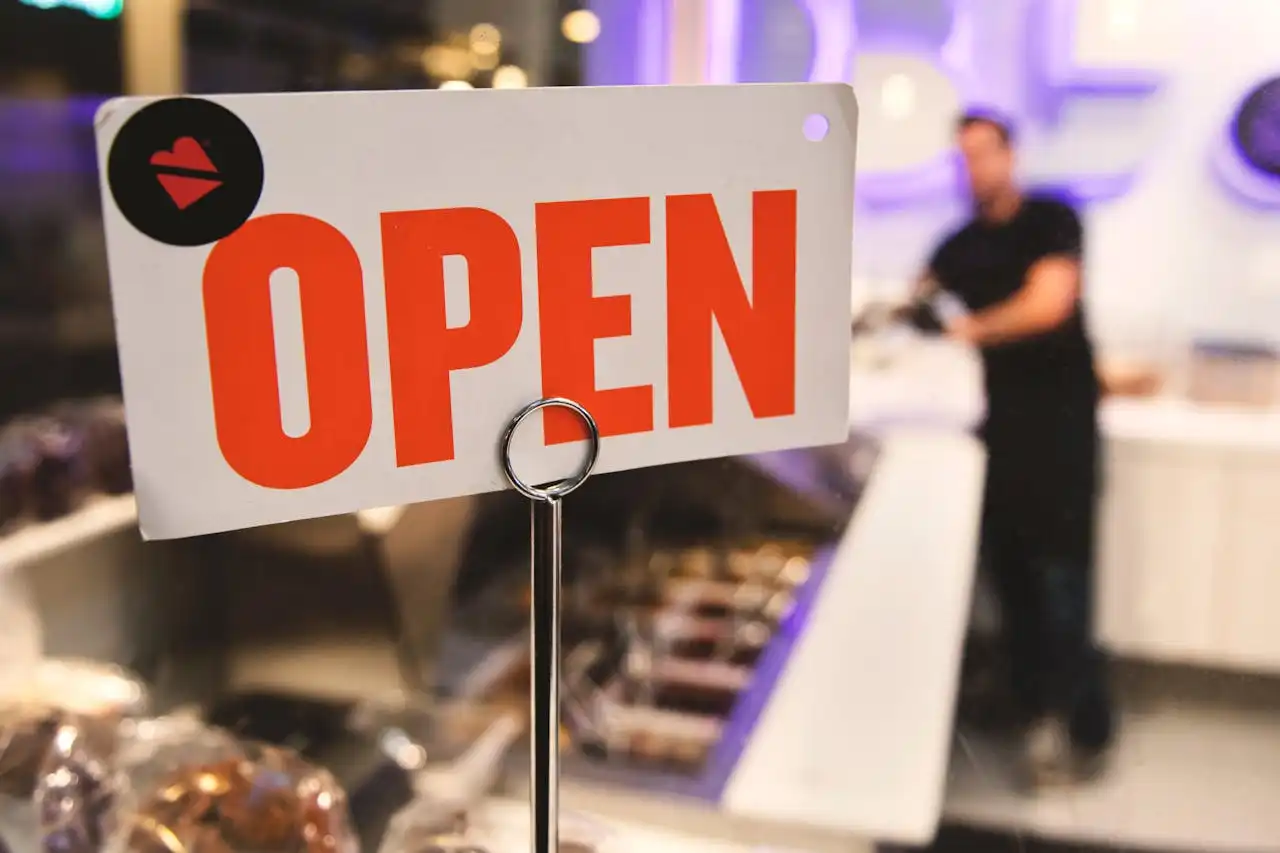How to Start a Food Truck Business in Los Angeles, CA
With its loyal customer base and diverse food scene, Los Angeles is a great place to start a food truck business. We look at the steps needed to get started and stay on the right side with the city of angels.
Tauseeq Magsi
loading...

So, you've decided to start a food truck business in Los Angeles? Great choice!
Los Angeles isn't just famous for its culture and entertainment. It's also known for its perfect weather, which is a big deal for food trucks.
In LA, you don't have to worry about snow or extreme weather. In fact, according to a recent report, LA sees only about 36 days of rain a year.
This means you can serve your hungry customers almost every single day. Also, with its diverse food scene and passion for street food, LA is the perfect place to start rolling your food truck business.
Now, let's talk in detail about how to start a food truck business in Los Angeles.
Your Step-by-Step Food Truck Launch Guide in Los Angeles
All set to take your food truck out on the streets of Los Angeles? Wonderful!
You can share your tasty food with a lot of people by starting a food truck business. But you should know the steps that need to be taken.
It might seem hard to learn how to start a food truck in Los Angeles, but with the right guidance, it's totally doable.
We'll walk you through each step in this guide in a clear and easy way.
Let's get started!
Step 1: Develop Your Business Plan and Choose the Right Business Entity
The first step in starting your food truck business in Los Angeles is developing a solid business plan and deciding on the right business entity.
Your business plan will act as your roadmap to success. It should outline your concept, target market, menu, pricing strategy, and financial projections. Think of this plan as your game plan for success.
Here's how to do it:
Research Business Entities
Understand the pros and cons of different business structures: sole proprietorship (easiest to start, yet risky if you get sued or fined.), partnership (shared control and profit), LLC (flexible and limited liability), or corporation (slightly complex, but with tax benefits).
Consult with Professionals
Seek advice from a lawyer or accountant to help you make the best decision for your business needs and goals.
File the Necessary Paperwork
Once you've decided on your business entity, register it with the appropriate governmental body. This step is important to ensure your business is legal and recognized.
Step 2: Get Your EIN
Next, you need an Employer Identification Number (EIN), also known as a Federal Tax ID Number. The IRS issues this number. It's like a Social Security Number for your business. It helps identify your business and lets you hire employees. If you're planning to run the food truck by yourself as a sole proprietor, you can use your Social Security Number instead.
Getting an EIN is easy. You can apply for it online at the IRS website. It's free and you get it almost immediately. Keep this number handy because you'll need it for various business-related tasks.
Step 3: Choose and Register Your Business Name
Next up is choosing a name for your business. This is both a fun and necessary step. Your business name is how customers will remember you. If you're using a name that isn't your own, you need to file a Fictitious Business Name (FBN) Statement.
You can do this at the Office of the County Clerk. This step is super important because it makes your business legally recognized. Plus, it helps avoid any mix-ups with other businesses.
Check online to make sure your chosen name isn't already taken. Then, fill out the necessary forms and pay the fee. Once everything is approved, your business name is official!

Step 4: Obtain All Required Permits and Licenses to Legally Operate Your Food Truck
To legally operate your food truck in Los Angeles, you need several permits and licenses. Understanding how to get a food truck license in Los Angeles is essential to avoiding any legal hassles.
Here's a detailed breakdown of what you need:
1. Business License
First, you need a general business license from the City of Los Angeles to start your food truck business. This license is very valuable. It's the first step to making your food truck legal. You can apply for this license online on the city's website. The website is pretty easy to use and will guide you through the steps.
Usually, this license costs around $50-$100 per year. Remember to renew it every year so you can keep running your business without any issues.
2. Health Permit
Next, you need a health permit from the Los Angeles County Department of Public Health. This permit makes sure your food truck meets all health and safety standards. You will need to send detailed plans of how you prepare and store food in your truck.
Health inspectors might visit your truck to check if everything is clean and safe. Keeping your truck clean and following health rules will help you pass the inspection.
3. Mobile Vendor Permit
For selling food on the streets of Los Angeles, you need a mobile vendor permit. This permit shows that your food truck follows local vending rules. As of this writing, the cost is $291 annually.
Applying for this permit means you agree to follow the rules about where and how you can sell your food. This permit is essential for being recognized as a legal food vendor in the city.
Step 5: Ensure Compliance with Health Regulations by Securing a Commissary Space
In California, you need to use a commissary as your base for your food truck business. It’s the place where you will prepare your food, store your supplies, and park your truck when you’re not using it.
A commissary helps make sure you follow health regulations. It has all the facilities you need, like refrigerators and storage space. It also has areas to wash your equipment and your truck. Renting a spot at a commissary is useful for keeping your business running smoothly and legally.
To find a commissary, you can look online or ask other food truck owners for recommendations. Once you find a good fit, you can sign a rental agreement and get started.
Having a commissary will make sure everything you do is up to code and keeps your food safe and yummy for all your customers.
Step 6: Build Your Team by Hiring the Right People
As you start your food truck business, hiring the right team is key. At the very least, you should have a minimum crew of two people. You will need a cook to prepare the food and another person to serve customers and handle payments.
As your business grows, you may need more staff. Consider hiring people to help with daily operations, manage your social media accounts, and keep the kitchen and truck clean.
Check out the official city of Los Angeles page for information on extra pay and work rules.
Having more hands on deck can make your business run more smoothly and help you serve more customers efficiently.

Step 7: Partner with a Waste Disposal Service to Manage Waste Properly
Managing waste is an important part of running a food truck. Proper waste disposal not only keeps your truck clean but also helps you follow city health regulations.
When your food truck is parked, trash can accumulate quickly. Customers are ordering food, and waste builds up. This can become unsightly and should not pile up in front of customers. Most food trucks use on-site waste containers to manage trash during business hours. These containers are kept out of sight but are easily accessible for staff.
To handle waste, you can partner with a waste disposal service. These companies can provide you with dumpsters and regular pick-up services. You can also find designated dumping stations in the city designed specifically for food truck waste.
The city provides guidelines on how to properly dispose of waste, so make sure you understand them and follow them closely. Proper waste management shows your commitment to health and safety.
Step 8: Set Up Reliable Water and Power Sources for Your Food Truck
Access to water and power is essential for any food truck. Many food trucks use generators to produce electricity. Generators can power your cooking equipment, lights, and other electrical appliances.
For water needs, you can use water tanks. These tanks can store clean water for cooking and cleaning, and they can also hold used water for proper disposal later. You must understand and comply with city health regulations regarding waste water disposal, as improper disposal can lead to significant fines or penalties. For example, gray water, which includes used water from sinks, must be disposed of at designated facilities and not in storm drains.
Consult with your truck supplier to find solutions tailored to your specific needs. Ensuring you have a reliable water and power supply will keep your operations running smoothly and compliant with health regulations.
Step 9: Get Your Food Truck Insured
Providing amenities can make your food truck more inviting and comfortable for your customers. Offering small tables and chairs gives people a place to sit and enjoy their meal.
However, the amount of space you have and city regulations will impact what you can provide. Make sure to check with local authorities to see what is allowed. If you can offer seating, it will enhance the customer experience and make your food truck a popular spot to eat.
Based on regulations, the city of Los Angeles allows small tables that could accommodate up to 6 guests at a time. This means that you can create a small dining area that not only attracts more customers but also encourages them to stay longer and enjoy their meals comfortably.
Step 10: Get Ready to Launch Your Food Truck Business
As you get ready for your food truck's big debut, there are a few more significant things to consider.
Ensure your food truck's design complies with California's signage rules.
Consider cash-only payments or modern options like USSD transactions (a protocol for mobile banking without internet) and online payment platforms.
Think about how you will market your new business.Use both traditional and digital marketing methods.Your food truck itself is a great way to advertise so, choose your place wisely.Choose a catchy name and eye-catching design for your truck.Decide on the payment options you will offer your customers.
Bonus Step: Don't Forget About Fire Safety
It's very important to not overlook fire safety when running your food truck. Ensuring your business and customers are protected from fire hazards is crucial.
You can obtain a fire safety permit from your local fire department. This permits make sure you are following all the required fire safety regulations.
Next, equip your food truck with the right fire extinguishers. Having them on hand is essential for quickly putting out any fires that might occur.
Don't forget to conduct regular safety drills with your team. These drills will help everyone know what to do in case of a fire, which can save lives and keep your business safe.
If you follow these steps carefully, you can help make sure that your food truck is safe and meets fire safety standards.
Food Truck Business Launch Timeline
Starting a food truck business can be both challenging and fun to plan and carry out. We've made a rough list of important steps and how long they should take to help you stay organized and on track.
You can make sure you're ready for a good opening day by sticking to this schedule.
It's a good idea to tackle some of these tasks side by side, as it can help you save time and streamline your preparations.
| Task | Estimated Duration |
|---|---|
| Develop Business Plan | 1 week |
| Obtain Permits and Licenses | 4-8 weeks |
| Acquire Food Truck | 6-12 weeks (depending on custom orders) |
| Secure Funding (as needed) | 3-6 weeks |
| Assemble Team | 2-3 weeks |
| Utilities Setup | 1-2 weeks |
Takeaway
If you want to know how to start a food truck business in Los Angeles, you need a good plan, the right permits, a truck that works well, and a great team.

Every step is important. Get some things done at the same time to save time.
Just follow these steps on how to start a food truck in Los Angeles, and your truck will be ready to serve tasty food in no time.
You need to stay focused, work hard, and enjoy the process. Have fun!
©2025 Cocina Digital Hospitality Group, Inc. All rights reserved.
No part of this publication may be reproduced, stored in a retrieval system, or transmitted in any form or by any means, electronic, mechanical, photocopying, recording, or otherwise, without the prior written permission of the publisher.
We use cookies to enable you to use our site, understand how you use our site, and improve your overall experience.
Cookies allow us to personalize content, track which pages are most popular and least popular, and provide advertising that may be relevant to you.
Please note that cookies that are essential to the proper functioning of the site are required and cannot be disabled.
They are usually only set in response to actions made by you which amount to remembering your settings, a request for services, such as setting your privacy preferences, logging in, or filling in forms.
As such, they are the only cookies that are enabled by default.
You can set your browser to block or alert you about these cookies.
By continuing to use our site, you accept our use of cookies.